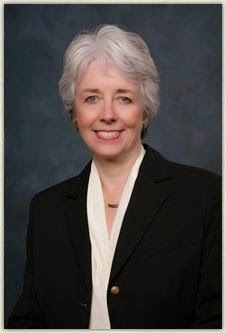Advocates must sell reform as political winds blow, Luallen says

Kentucky Health News
Advocates of health reform must arm themselves with information about its success in Kentucky to fight back against its critics as the 2015 gubernatorial election looms, Lt. Gov. Crit Luallen told them at the Kentucky Voices for Health annual meeting Jan. 12.
 |
| Lt. Gov. Crit Luallen |
“Improving our state’s health is not a task that can be accomplished in months. It doesn’t fit with the cycles of gubernatorial administrations,” Luallen said, alluding to the upcoming election and those for the legislature in 2016.
“I have seen time and again that Kentucky fails to remain on course for the sustained commitment that it takes to successfully tackle our toughest challenges. Too often in the past, we’ve let political posturing derail our efforts, too often we take the easy course when faced with difficult decisions.”
She added, “We have the opportunity to truly change the future of Kentucky if we can cement these reforms in a way that has lasting and sustainable impact. But the key to that sustained commitment is your voices being strong when the political winds make staying strong during the course difficult.”
Luallen, who has worked for six Kentucky governors, said governors often slow down during their last year of service, but she said this might be Gov. Steve Beshear’s “most important year” as he works to keep his health initiatives moving forward.
She listed many of the results: increased health coverage for children and low-income working families, expanded mental health and substance abuse treatments, increased cancer screenings, 114,000 people already signed up for health coverage in the second enrollment period, and 12,000 new jobs created in Kentucky health care because expansion of Medicaid and subsidies for private coverage have expanded the health-care industry.
In the longer term, she said, “The meaningful reforms we have implemented will lead to a higher quality of life, better attendance at school, a stronger work record and less chance of bankruptcy due to illness or disease, but only if we stay the course.”
Luallen reminded the advocates, many of who are paid lobbyists, to also talk about the challenges that remain with the Patient Protection and Affordable Care Act.
One of the biggest concerns critics have about the law is that Kentucky won’t be able to pay for its share the care for newly eligible Medicaid patients, which will start in 2017 and reach the law’s limit of 10 percent in 2020.
Beshear says the expansion will pay for itself, based on a study by the Pricewaterhouse Coopers accounting firm and the University of Louisville‘s Urban Studies Institute. However, the newly-eligible Medicaid enrollment last year was more than double the original projection, nearing levels that had been predicted would not be seen until 2020, and the 12,000 jobs are about two-thirds of the total projected by that time.
Beshear has ordered up a new study, using a year’s experience, which Luallen said is to be completed by the end of January. She said that the economic impact of the law could be higher than first expected “because we have seen more people sign up, especially in the Medicaid arena, which means more federal dollars flowing to the state.”
Luallen said that when critics say, “We can’t afford to do it,” advocates should say, “Yes we can!”
By virtue of her office, to which Beshear appointed her when Jerry Abramson resigned to take a White House job, Luallen heads Kyhealthnow, an aggressive plan to improve Kentuckians’ health, with seven measurable goals, over the next five years. “We will be looking for partners as we work to transition Kyhealthnow’s mission beyond this administration,” she said.
On perhaps the most pressing health issue of the moment, a proposed statewide smoking ban, Luallen said there is increased interest in the House and more support in the Republican-controlled Senate, where the ban has never even made it out of committee. “We believe that this truly has a chance of passing this session,” she said, “if we can all speak with one voice and get behind it and make the case that there is not a single thing we can do that would have bigger impact in this state’s health statistics than to lower the rate of smoking and exposure to secondhand smoke.”
Luallen is a colon cancer survivor and has lost her mother, two brothers, two aunts and an uncle to cancer. She said that her personal experience gives her a unique perspective in understanding the devastating effects of cancer in Kentucky and has contributed to her passion for health policy. Kentucky ranks first for cancer and cancer deaths.
She said, “I often say that people in Kentucky fall into one of two groups, those who have been touched by cancer and those who have not been touched yet.”